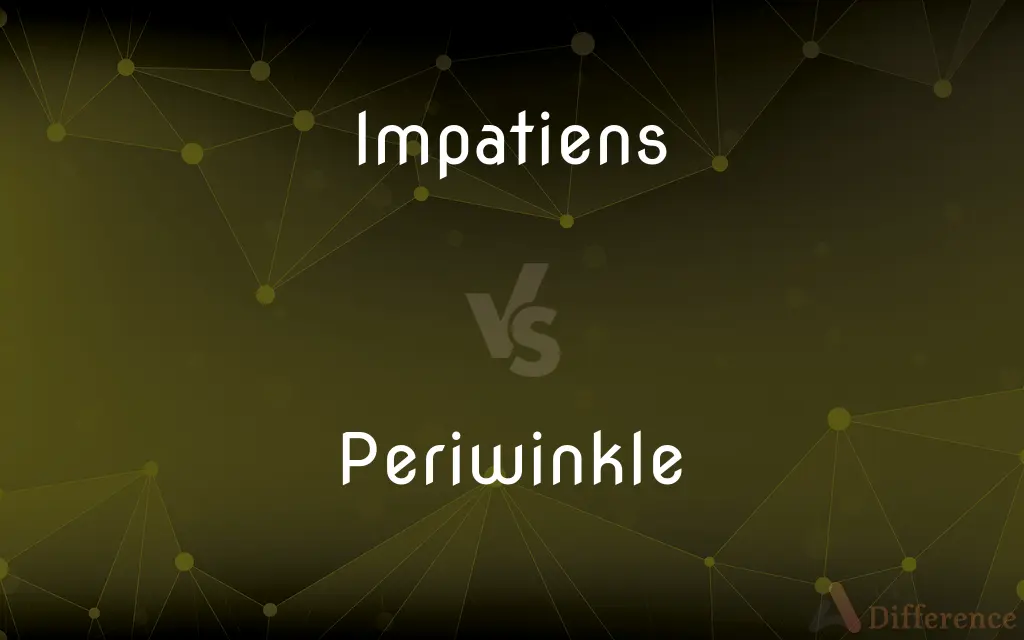Impatiens vs. Periwinkle — What's the Difference?
By Maham Liaqat & Urooj Arif — Updated on May 17, 2024
Impatiens are flowering plants known for their vibrant colors and shade tolerance, while periwinkles are evergreen groundcovers with star-shaped flowers and resilience in various conditions.

Difference Between Impatiens and Periwinkle
Table of Contents
ADVERTISEMENT
Key Differences
Impatiens are popular garden plants appreciated for their bright, colorful flowers and ability to thrive in shaded areas. They come in a variety of colors, including red, pink, white, and purple, making them a favorite for adding pops of color to shaded garden beds and containers. Periwinkles, on the other hand, are known for their hardy nature and versatility as groundcovers. Their star-shaped flowers typically bloom in shades of blue, purple, or white, and they can grow in both sun and shade, though they prefer well-drained soils.
Impatiens require regular watering and are more sensitive to downy mildew, which can devastate their population if not managed properly. Periwinkles are more drought-tolerant and resistant to pests and diseases, making them easier to maintain in various landscapes.
In terms of growth habit, impatiens are annuals in cooler climates, needing to be replanted each year, while periwinkles are perennials, providing year-round ground cover in suitable climates. Both plants, however, offer aesthetic and functional benefits to gardeners.
Comparison Chart
Flower Colors
Red, pink, white, purple
Blue, purple, white
Light Requirements
Shade to partial shade
Full sun to partial shade
ADVERTISEMENT
Growth Habit
Annuals (in cooler climates)
Perennials (evergreen groundcover)
Water Needs
Regular watering
Drought-tolerant
Disease Resistance
Susceptible to downy mildew
Resistant to most pests and diseases
Compare with Definitions
Impatiens
A flowering plant with brightly colored blooms.
The garden was filled with vibrant impatiens in every shade of pink.
Periwinkle
Also known as Vinca, used for soil erosion control.
Periwinkle is planted to stabilize the slope and prevent erosion.
Impatiens
Sensitive to downy mildew disease.
Unfortunately, the impatiens were affected by mildew this year.
Periwinkle
An evergreen groundcover with star-shaped flowers.
The periwinkle spread quickly, covering the hillside in blue flowers.
Impatiens
A popular choice for shaded areas in gardens.
Impatiens thrive in the shadowy corners of the yard.
Periwinkle
Hardy and adaptable to various light conditions.
Periwinkle thrives in both sunny and shady spots.
Impatiens
Known for their ability to bloom continuously through the summer.
These impatiens will provide color all summer long.
Periwinkle
Resistant to most pests and diseases.
Unlike many garden plants, periwinkle rarely suffers from infestations.
Impatiens
Often grown as annuals in cooler climates.
Each spring, she replants her impatiens beds.
Periwinkle
Provides year-round ground cover in suitable climates.
The periwinkle kept the garden green even in winter.
Impatiens
Impatiens is a genus of more than 1,000 species of flowering plants, widely distributed throughout the Northern Hemisphere and the tropics. Together with the genus Hydrocera (one species), Impatiens make up the family Balsaminaceae.
Periwinkle
An Old World plant with flat five-petalled, typically bluish flowers and glossy leaves. Some kinds are grown as ornamentals and some contain alkaloids used in medicine.
Impatiens
Any of various plants of the genus Impatiens, especially several species that are widely cultivated for their colorful flowers and attractive foliage. Also called balsam.
Periwinkle
Another term for winkle
Impatiens
Any of various ornamental plants of the genus Impatiens.
Periwinkle
Any of various marine snails of the family Littorinidae, having thick, cone-shaped, whorled shells, especially Littorina littorea, an edible species of the North Atlantic Ocean.
Impatiens
A genus of plants, several species of which have very beautiful flowers; - so called because the elastic capsules burst when touched, and scatter the seeds with considerable force. Called also touch-me-not, jewelweed, and snapweed. Impatiens Balsamina (sometimes called lady's slipper) is the common garden balsam.
Periwinkle
The shell or the flesh of any of these snails.
Periwinkle
Any of several shrubby, trailing, evergreen plants of the genus Vinca, especially V. minor, having glossy, dark green, opposite leaves and flowers with a blue, funnel-shaped corolla.
Periwinkle
Any of several erect herbs of the genus Catharanthus, especially C. roseus, having flowers with a rose-pink or white salverform corolla and a closed throat.
Periwinkle
A pale purplish blue.
Periwinkle
Any of several evergreen plants of the genus Vinca with blue or white flowers.
Periwinkle
Similar plants of genus Catharanthus.
Periwinkle
A color with bluish and purplish hues, somewhat light.
Periwinkle
A mollusk of family Littorinidae.
Periwinkle
Of pale bluish purple colour.
Periwinkle
Any small marine gastropod shell of the genus Littorina. The common European species (Littorina littorea), in Europe extensively used as food, has recently become naturalized abundantly on the American coast. See Littorina.
Periwinkle
A trailing herb of the genus Vinca.
Periwinkle
Chiefly trailing poisonous plants with blue flowers
Periwinkle
Commonly cultivated Old World woody herb having large pinkish to red flowers
Periwinkle
Small edible marine snail; steamed in wine or baked
Periwinkle
Edible marine gastropod
Common Curiosities
What are impatiens known for?
Impatiens are known for their bright, colorful flowers and ability to thrive in shaded areas.
What is the common use of periwinkle in gardens?
Periwinkle is commonly used as an evergreen groundcover to prevent soil erosion and cover large areas.
What climates are impatiens best suited for?
Impatiens are best suited for cooler climates where they are grown as annuals.
Do impatiens need a lot of water?
Yes, impatiens require regular watering to maintain their vibrant blooms.
Can periwinkles grow in full sun?
Yes, periwinkles can grow in both full sun and partial shade, though they prefer well-drained soils.
Are periwinkles resistant to pests and diseases?
Yes, periwinkles are generally resistant to most pests and diseases.
How do impatiens perform in shaded gardens?
Impatiens perform very well in shaded gardens, making them a popular choice for such areas.
What flower colors are common in impatiens?
Common flower colors in impatiens include red, pink, white, and purple.
Are periwinkles drought-tolerant?
Yes, periwinkles are relatively drought-tolerant and require less frequent watering than impatiens.
How often do impatiens need to be replanted?
Impatiens need to be replanted each year in cooler climates, as they are annuals in these regions.
What is a major disease concern for impatiens?
Downy mildew is a significant disease concern for impatiens.
Can periwinkles handle poor soil conditions?
Yes, periwinkles are quite adaptable and can handle a range of soil conditions, provided they are well-drained.
What is a notable difference in the growth habit between impatiens and periwinkles?
Impatiens are annuals in cooler climates, needing yearly replanting, while periwinkles are perennials providing continuous ground cover.
Do periwinkles provide year-round coverage?
Yes, periwinkles provide year-round ground cover in suitable climates.
What are the typical flower colors of periwinkles?
Periwinkles typically have blue, purple, or white flowers.
Share Your Discovery

Previous Comparison
Subjunctive vs. Optative
Next Comparison
Overcrossing vs. UndercrossingAuthor Spotlight
Written by
Maham LiaqatCo-written by
Urooj ArifUrooj is a skilled content writer at Ask Difference, known for her exceptional ability to simplify complex topics into engaging and informative content. With a passion for research and a flair for clear, concise writing, she consistently delivers articles that resonate with our diverse audience.















































